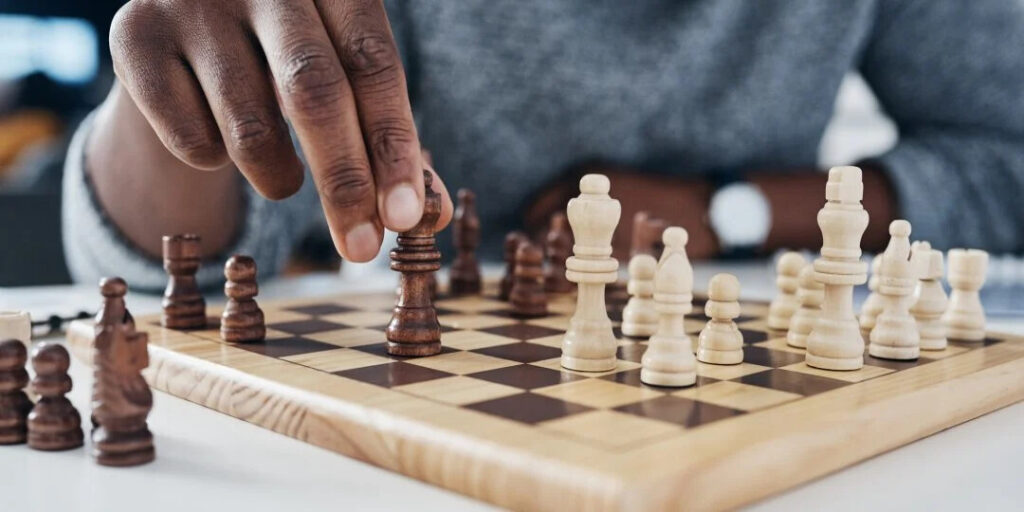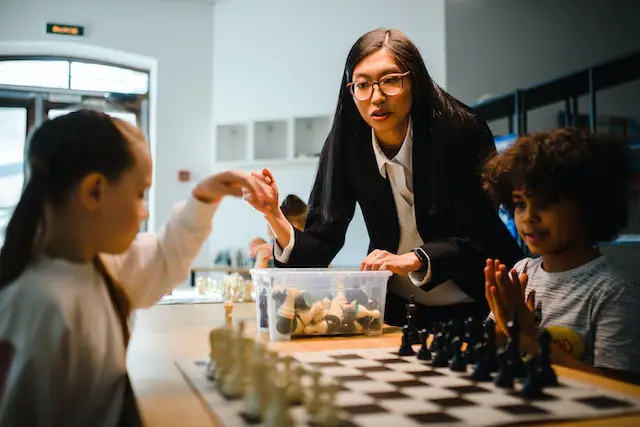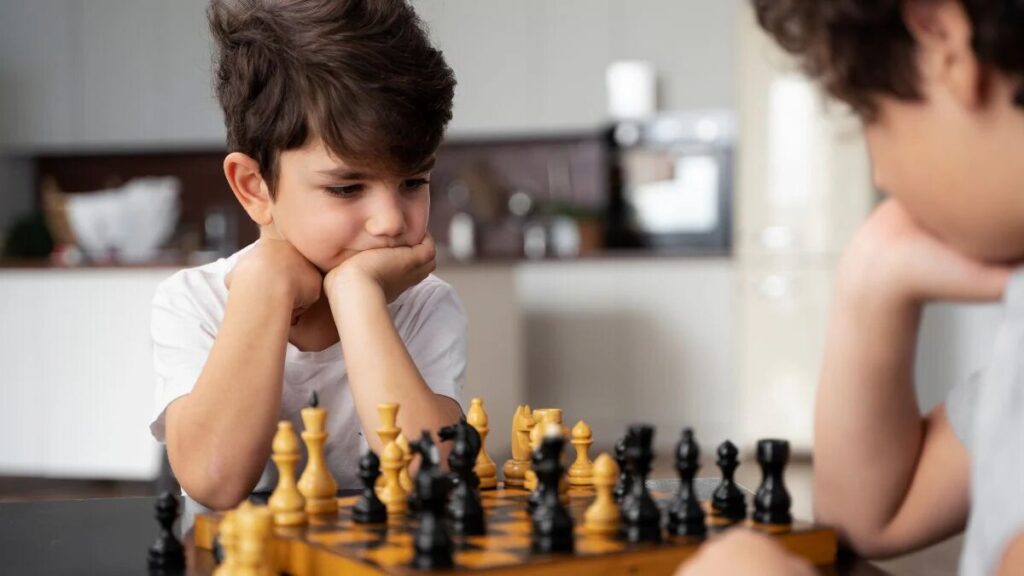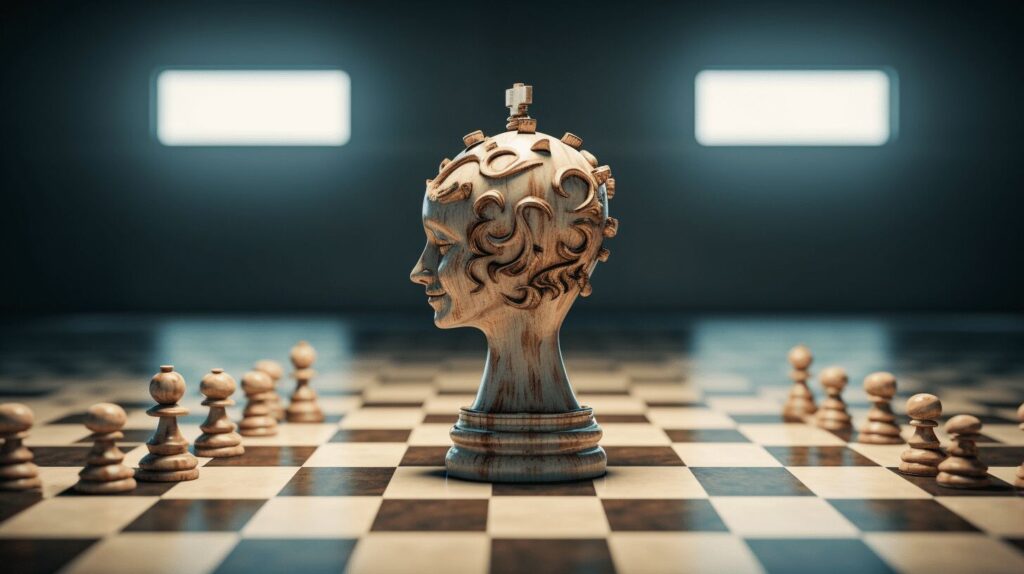Chess has been a popular game for centuries, known for its deep strategies and endless possibilities. But beyond the competition, chess offers something much more valuable—it helps in cognitive development and brain maturation. Playing chess is like giving your brain a workout. It engages different parts of the brain, helping to build important mental skills like problem-solving, memory, and concentration. For children and adults alike, the game can play a vital role in developing a sharper, more flexible mind.
How Chess Stimulates Brain Growth
Our brains are constantly growing and adapting, especially during childhood and adolescence. As the brain matures, it forms stronger connections between neurons, allowing for better memory, quicker thinking, and more effective problem-solving.
Chess helps accelerate this brain development by engaging both hemispheres of the brain, forcing them to work together in a way that few other activities can.
Engaging Both Hemispheres of the Brain
The human brain is divided into two hemispheres: the left and the right. Each side is responsible for different types of thinking.
The left hemisphere is known for handling logical thinking, numbers, and analysis, while the right hemisphere manages creativity, spatial awareness, and intuition.
Chess is unique because it stimulates both sides of the brain simultaneously. On the one hand, players must think logically about their moves, calculating risks and rewards and anticipating their opponent’s strategies.
On the other hand, they must also visualize the board, think creatively about their next move, and recognize patterns. This dual engagement helps strengthen the connections between the two hemispheres, promoting overall brain development.
Strengthening Executive Functions
Executive functions are the mental skills that allow us to plan, focus, and juggle multiple tasks. They are crucial for success in both school and life.
Chess helps improve these executive functions by forcing players to plan their moves ahead, think strategically, and adapt to changes as the game progresses.
For example, chess requires kids to manage their time, anticipate what will happen next, and evaluate the consequences of their decisions.
These are all important components of executive functioning. Over time, regular chess practice helps strengthen these mental processes, making kids better problem solvers and more effective learners.
Chess and Memory Development
One of the standout benefits of chess is how it improves both short-term and long-term memory. Memory is a crucial part of brain maturation, allowing us to retain and apply knowledge over time.
Whether a player is recalling the rules of the game, remembering successful strategies from past matches, or keeping track of complex board positions, chess engages the brain’s memory systems in meaningful ways.
Boosting Short-Term Memory
In a typical chess game, players need to hold a lot of information in their short-term memory. They must remember the position of each piece, what moves they’ve made, and what strategies they’re planning to use next.
This constant mental juggling sharpens short-term memory and helps players learn to retain information more efficiently.
For children, this improvement in short-term memory can have a direct impact on their academic performance. The same skills they use to remember chess moves can be applied to tasks in school, such as following multi-step instructions or solving math problems in their head.
Chess trains the brain to hold and manipulate multiple pieces of information at once, which is especially useful for handling schoolwork and exams.
Enhancing Long-Term Memory
Over time, experienced chess players develop the ability to recall patterns, strategies, and opening moves from memory. This ability to store and retrieve complex information is a sign of well-developed long-term memory.
Chess players often memorize different openings, tactical combinations, and endgame strategies, which they then apply in future games. This process helps build strong neural pathways, making long-term memory retrieval more efficient.
For example, a child who plays chess regularly will start to recognize familiar board positions and strategies. They can quickly recall what worked in previous games and apply that knowledge to new situations.
This kind of memory work strengthens the brain’s capacity to store information over long periods, which is useful for learning new subjects or mastering difficult topics in school.
Pattern Recognition and Cognitive Development
One of the most interesting ways that chess enhances memory is through pattern recognition. Chess players become skilled at recognizing certain patterns in piece positioning and moves.
Whether it’s a checkmate setup or a common defense tactic, the brain begins to store these patterns, making it easier for players to react quickly in similar situations.
This kind of pattern recognition is closely tied to cognitive development. The more patterns the brain recognizes, the faster it can process information.
In real life, pattern recognition helps in various areas—whether it’s reading fluently, understanding complex ideas in science, or even recognizing social cues in conversations.
Chess gives the brain a constant workout in pattern recognition, which speeds up learning and problem-solving abilities.
Enhancing Problem-Solving Skills Through Chess

Problem-solving is at the heart of chess, making it one of the best tools for developing this critical cognitive function. Every move in chess presents a problem to solve, as players must figure out how to outmaneuver their opponent while protecting their own pieces.
This constant mental engagement helps build sharper problem-solving skills, which are essential for academic success and real-life challenges.
Breaking Down Complex Problems
In chess, players are frequently faced with complex situations that require careful thought and analysis. Should they attack, defend, or sacrifice a piece to gain a better position later in the game?
To make these decisions, players must break the problem down into smaller, manageable parts, weigh their options, and choose the best move.
This step-by-step approach to problem-solving is a valuable life skill. Kids who play chess regularly become more comfortable dealing with complex problems. In school, this can translate to breaking down difficult math problems, writing essays, or conducting science experiments.
Chess teaches children that even the most complex problems can be solved if they take the time to think things through logically.
Developing Strategic Thinking
One of the most important aspects of chess is strategic thinking—planning several moves ahead and anticipating what the opponent might do. Chess encourages children to think not only about their immediate move but also about the long-term consequences of their actions.
They need to develop a strategy that will hold up over the course of the game, which involves forward-thinking and the ability to adapt to changing circumstances.
Strategic thinking helps children in countless areas of life. In school, it enables them to plan projects, manage their time effectively, and tackle difficult subjects by breaking them down into smaller goals.
In life, strategic thinking helps kids approach challenges with a plan in mind, rather than acting impulsively.
Cognitive Flexibility and Adaptability
In every game of chess, the situation on the board is constantly changing. A well-thought-out plan can be disrupted by a single unexpected move from the opponent.
When this happens, players must quickly adapt their strategy and rethink their approach. This requires cognitive flexibility—the ability to adjust thinking in response to new information.
Cognitive flexibility is crucial for problem-solving in real life. Whether it’s handling a change in plans, adapting to new challenges in school, or solving unexpected issues, being able to shift strategies is a vital skill.
Chess teaches children how to stay mentally agile and adjust their problem-solving approach as new challenges arise.
Chess as a Tool for Improving Focus and Attention

In today’s fast-paced world, children (and adults) often struggle with maintaining focus and attention, especially with distractions like smartphones, video games, and social media.
Chess, however, provides a structured way to develop and improve these crucial cognitive skills. By its very nature, chess requires players to concentrate deeply, often for extended periods, which builds mental stamina and sharpens attention.
Sustaining Attention Over Time
Chess games, particularly longer formats, can last anywhere from 30 minutes to several hours. During this time, players need to remain engaged, thinking critically about their moves and anticipating their opponent’s actions.
This requirement to stay focused for such long stretches helps children develop the ability to sustain attention—something that’s vital for academic performance, whether during exams or while working on homework.
Unlike many fast-paced activities that offer instant gratification, chess rewards patience and deep thinking.
Kids who learn to play chess often find it easier to focus during classroom lessons or while studying because they’ve practiced sustained concentration on the chessboard. They become better at tuning out distractions and staying committed to a task until it’s completed.

Blocking Out Distractions
One of the most challenging aspects of chess is learning how to block out distractions—both internal and external. Players must resist the urge to make impulsive decisions, even when faced with a ticking clock or a tough position on the board.
The ability to focus solely on the game, ignoring background noise or time pressure, teaches children how to manage distractions in other areas of life.
This skill is particularly valuable for school-aged children who are often bombarded by distractions, whether it’s noise in the classroom or the temptation of electronic devices at home.
By playing chess regularly, kids learn how to zero in on a task and complete it, a skill that can help them in nearly every aspect of their academic and personal lives.
Enhancing Executive Function
Executive function refers to the brain’s ability to plan, organize, and complete tasks efficiently. It’s an essential part of cognitive development, allowing children to think ahead, set goals, and manage time effectively.
Chess is an excellent tool for improving executive function because it requires players to plan several moves in advance, keep track of their pieces, and adjust their strategies based on their opponent’s actions.
For example, during a chess game, a child might need to develop a long-term strategy to checkmate their opponent while also dealing with immediate threats on the board.
This juggling of short-term and long-term planning strengthens executive function, helping children become better at managing schoolwork, organizing their time, and thinking through complex tasks.
Emotional Development and Chess: Building Patience, Resilience, and Emotional Control

Chess is not only a mental game but also an emotional one. It teaches kids to manage their emotions, deal with wins and losses gracefully, and develop important character traits like patience and perseverance.
These emotional skills are crucial for brain maturation and personal growth, helping children navigate the ups and downs of both the chessboard and life.
Learning Patience
Chess is not a game that rewards impulsive decisions. To succeed, players must carefully plan each move, waiting for the right moment to execute their strategies.
This slow, methodical approach teaches children the value of patience. They learn that rushing into a move can lead to mistakes, and that sometimes it’s better to wait and think things through before acting.
This lesson in patience carries over into daily life. Children who play chess learn to wait for the right opportunities rather than making impulsive decisions.
Whether it’s waiting for their turn in class, managing frustrations in social situations, or taking the time to solve a difficult problem in school, the patience learned through chess can help them approach life’s challenges with a calm and thoughtful mindset.
Building Emotional Resilience
In chess, losing is a common part of the learning process. Even the best players lose games, and handling these losses is a key part of emotional growth.
Chess teaches children that setbacks aren’t failures; they’re opportunities to learn. Every mistake provides valuable insight into what went wrong and how to improve next time.
This resilience is crucial for brain development and overall emotional health. By learning to accept losses and grow from them, children become more adaptable and less afraid of failure.
In life, this resilience helps them bounce back from disappointments—whether it’s a low grade on a test or a disagreement with a friend. Chess teaches that growth comes from perseverance and continuous effort, not from avoiding challenges.
Controlling Emotions Under Pressure
Chess often involves high-pressure situations, especially in timed games or competitive matches. Players must remain calm and focused, even when they’re under stress or in a losing position.
Chess teaches emotional regulation—the ability to manage feelings like frustration, anxiety, or excitement without letting them affect decision-making.
For children, this ability to control emotions is incredibly valuable. Whether they’re dealing with academic pressures, peer conflicts, or personal challenges, the emotional control they develop through chess helps them stay focused and make thoughtful decisions.
Instead of reacting impulsively, they learn to take a step back, assess the situation, and move forward with a clear head.
Handling Success and Failure Gracefully
Another important emotional lesson chess offers is how to handle both success and failure gracefully. Winning a chess match can be exhilarating, but chess players also learn that victory isn’t just about personal triumph—it’s about respect for the opponent and appreciation for the challenge.
Likewise, losing isn’t something to be ashamed of, but a natural part of the game that offers lessons for the future.
These lessons in sportsmanship help children develop humility, kindness, and respect, which are essential for their social and emotional development. In life, they’ll be able to handle successes without becoming overconfident and deal with failures without feeling discouraged.

Chess as a Lifelong Brain-Enhancing Tool
While chess is an excellent activity for developing the brain in childhood, its benefits extend well beyond those early years.
Chess continues to provide cognitive and emotional growth throughout life, making it a valuable tool for mental fitness at any age. Whether you’re a child just learning the game or an adult seeking to keep your mind sharp, chess offers challenges that stimulate the brain and promote long-term mental health.
Preventing Cognitive Decline
For adults, particularly older individuals, chess is a powerful tool for maintaining cognitive function.
Research shows that mentally challenging activities like chess can help keep the brain sharp and may even delay the onset of cognitive decline associated with aging. By engaging in regular chess play, adults can strengthen memory, focus, and problem-solving skills, helping to preserve brain health well into later life.
A Lifelong Journey of Learning
One of the most exciting aspects of chess is that it offers endless opportunities for improvement. No matter how skilled a player becomes, there’s always something new to learn—whether it’s mastering an advanced strategy, experimenting with different openings, or studying famous games.
Chess fosters a love of learning and growth, helping players stay curious and intellectually engaged throughout their lives.
Wrapping it up
Chess is far more than a game—it’s a powerful tool for boosting brain maturation and cognitive development. From improving memory and focus to enhancing problem-solving skills and emotional resilience, chess provides lifelong benefits for both children and adults.
Whether you’re looking to support your child’s mental growth or sharpen your own cognitive abilities, chess offers a fun and engaging way to strengthen the mind.
At Global School of Chess, we’re passionate about helping players unlock these benefits. Ready to start your journey? Visit Global School of Chess and discover how chess can enhance your brain development.
READ NEXT:

